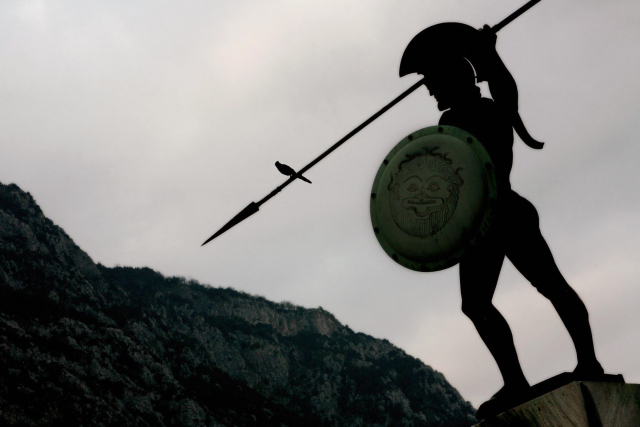Perhaps you have heard (or even believe) some or all of the elements of the following story about the past:
"Life in the past was crude and hard. People could not afford mercy or charity. People in primitive societies would leave the sick and weak behind to die, and even the ancient Greeks killed disabled infants through exposure."
I have frequently encountered this set of ideas, in various permutations. It shows up all over the internet in popular historical accounts:
"Infanticide was a disturbingly common act in the ancient world, but in Sparta this practice was organized and managed by the state. All Spartan infants were brought before a council of inspectors and examined for physical defects, and those who weren't up to standards were left to die...If a Spartan baby was judged to be unfit for its future duty as a soldier, it was most likely abandoned on a nearby hillside. Left alone, the child would either die of exposure or be rescued and adopted by strangers."
It is also quite wrong.
history.com/news/8-reasons-it-…
1/9

8 Reasons It Wasn’t Easy Being Spartan
From fitness tests for infants to state-sponsored hazing, find out why these ancient Greek warriors had a rough go of it.Evan Andrews (HISTORY)
EL SANTO NIÑO DE LA GUARDIA
Durante la segunda mitad del sXIV, en la localidad de La Guardia (Toledo), un niño fue cruelmente torturado y asesinado siguiendo un ritual mágico en el que un grupo de judíos y criptojudíos buscaban difundir una epidemia de cólera.
O, al menos, eso es lo que a día de hoy sigue afirmando parte de la Iglesia, como vemos en este artículo publicado en 2015 y cargado, todavía hoy, de propaganda antisemita y de un absoluto desprecio por la evidencia histórica.
oracionyliturgia.archimadrid.o…
Se conservan algunos de los documentos de este juicio, gracias a los cuales algunos historiadores tan poco sospechosos de rojeras como Luis Suárez Fernández (director de universidades durante la dictadura) han reconstruido coherentemente lo que realmente debió suceder.
En 1489 varios judeoconversos son detenidos por la Inquisición bajo la acusación de haber vuelto a sus viejas creencias judías. Al principio no hay nada más que esta acusación, pero bajo tortura, aparece el relato sobre un niño.
Los distintos acusados, bajo tortura, empiezan a lanzarse acusaciones unos a otros, incluyendo también a un par de judíos de la zona. Inmiscuyéndose los unos a los otros en la terrible historia de un niño raptado y torturado como blasfemo reflejo de la muerte de Jesucristo.
La única historia no obtenida bajo tortura la dio un judío que, enfermo y creyendo estar cerca de la muerte, pidió que le asistiera un rabino. Un monje se disfrazó de rabino y consiguió engañarle, consiguiendo, según él, una declaración que posteriormente el judío negaría.
Lo más curioso de esta historia es que no existe niño. De hecho, el niño no tiene ni nombre (la tradición posterior le adjudica el nombre de Cristóbal o el de Juan). No existen padres, los padres de los que se habla también son inventados. No hubo, por supuesto, cadáver.
Las distintas declaraciones están repletas de contradicciones importantes. Los acusadores tuvieron que crear un complicado relato en el que el niño fue transportado de un lado a otro (sin que nadie les viera) para explicar que cada uno hablara de sitios distintos.
Las mismas fechas son contradictorias, más allá de que todos decían que había sucedido en semana santa, según uno hacía cuatro años de aquello, según otro quince, según otro, once...
Los acusados fueron ajusticiados en 1491. La historia fue publicitada con gran eficacia por toda Castilla.
Unos meses después, la Reina Isabel firmaba la expulsión de los judíos. Sin duda, el caso del falso niño de La Guardia tendría su influencia en esta decisión.

El Santo Niño de La Guardia, mártir († 1489)
Nuestra Señora de la Fuencisla. Santos: Alberto de Jerusalén, Atanasio, Baldovino, Sergio, confesores; Irene, Aurelia, Neomisia, matronas; Arnolfo, Solemnio, Lupo, Cástor, Anacario, Anatalon, obispos; Antila, Bardomiano, Eucarpo, Herculano, Niño de L…Oración y Liturgia
#rant #libreoffice #Seitennummern
Also, ich komm ja echt gut mit meinem Writer in Libre Office klar. Und das viel besser als mit dem schrecklichen MS Word.
ABER: WARUM ist das Einfügen von Seitennummern so ein pain in the ass?
He, @LibreOfficeDE?
Kann man das nicht bisschen intuitiver gestalten?
Jedes verdammte mal, wenn ich ne Arbeit schreiben muss, muss ich wieder und wieder die Anleitung bemühen, weil es nicht einfach mit einem einzigen Menüpunkt funktioniert.
Dafür, und nur dafür HASSE ich dieses Programm.
Man verdammt, es ist ein Office Programm, es sollte intuitiv im Schreibprozess zu bedienen sein. Nein, statt dessen schreibe ich vorher einen Entwurf, um nebenbei in nem frischen Dokument erstmal den Pain der Seitennummerierung zu bewältigen. Damit es mir nicht meinen Text kaputt macht.
😤😤😤🤯🤯
Kuffovci nie sú pomätenci ale prepnutý magory, teda je to asi to isté ale to moje pomenovanie je výstižnejšie.
youtube.com/watch?v=8Fa7fvMaTH…

Newsfilter: Pomätenci vo vláde už začali rušiť predstavenia národného divadla
1. Už rušia predstavenie v divadle. 2. Čo urobí Hlas? Nič. 3. Pospíšil sa nemá za čo hanbiť, Šatan áno.YouTube
Ak je mojim zaujmom mat tu kludny a dobry zivot, tak sa musim primarne snazit a slusne a funkcne riesenia. A teda preto ten "lepsi vykon OCTK".
Lebo sa samozrejme da napr. aj "brat spravodlivost do vlastnych ruk", ale to by v pripade ludi typu Kuffa rychlo vyeskalovalo:
- on mi zrusi divadlo
- ja mu zrusim omsu
- on prise zrusit mna
- ak sa mu podari zrusit mna, niekto dalsi skusi zrusit jeho
- …
vysledok: obcianska vojna
A prave any sme sa vyhli vojnam, mame zakony a OCTK.
Only a few days left to submit your #LAS2024 talk! Make sure to submit your proposal by Aug 21: conf.linuxappsummit.org/event/…
#KDE #GNOME #opensource #Linux
🛠️ Maintenance Planned August 21, 2024 9:00-11:00 PM EDT/1:00-3:00 AM UTC
In preparation for the new release, Bitwarden will be undergoing server and web maintenance from 9-11 PM EDT/1-3 AM UTC.
More Information on the Bitwarden Status Page →
status.bitwarden.com/issues/66…

Maintenance Window
## Release information In preparation for the new release, Bitwarden will be undergoing server and web maintenance from 9-11 PM EDT/2-4 AM UTC.status.bitwarden.com
friends, help me with a reality check here:
how many of you have 5+ years of experience in QA or dev
AND
3+ years using a GDS (eg Sabre, Amadeus)? 😅
I was hired as a Solaris sysadmin because they were selling a solution to an IBM shop (the IT dude hated Sun) and it would have cost way more on IBM.
It's at the time Sabre sold wholesale all that division to EDS.
I know nobody cares about this, but the real "scandal" is that Patreon DISBANDED THEIR INFOSEC DEPARTMENT.
There is nobody — NOBODY — running cybersecurity there.
Yet, all y'all care about is “Apple wants rent”.
Yep. 100%. Ask any of us who want to buy comics or audiobooks from someone besides Apple and we’ll gladly commiserate.
But, why on $DEITY’S own earth are you willing to put your $$$$ into an org who doesn’t care at all about the safety of your FINANCIAL SERVICES' data?
Who knew that the global human extinction ushered in by Skynet was caused by merely turning it on for the first time and watching it consume all the water and natural resources?
It didn't even need to get to that self-aware stage, or have enough reason to determine that "humans are a virus", or even ramp up the production of autonomous H/K drones and Terminators.
It just had to be powered on.
See: techradar.com/pro/water-consum…

AI push from US tech giants leads to skyrocketing water consumption figures
Millions of gallons being consumed each month in water-scarce areasEllen Jennings-Trace (TechRadar pro)

A Remote Control for Your Phone: The Hable One Keyboard
Typing on a smartphone is second nature to many of us. But for people who are visually challenged, it can be frustrating and even seem impossible. While virtual keyboards can be helpful, many are l…Assistive Technology at Easter Seals Crossroads
Global Assistive Device Subsidies and Policies | U.S., Canada, U.K. Guide
Discover financial assistance programs for electronic assistive devices in the U.S., Canada, and the U.K. Learn about subsidies, eligibility, and application processes for visual impairments.ZOOMAX TECHNOLOGY CO., LIMITED

4 ad blockers that still work with Chrome
The popular uBlock Origin will stop working in Chrome soon, but there are options that will keep going under the new standards.Michael Crider (PCWorld)
That book is poison: Even more Victorian covers found to contain toxic dyes
Old books with toxic dyes may be in universities, public libraries, private collections.

Introduction to European Accessibility Act and Compliance • DigitalA11Y
The hot topic across accessibility industry and digital businesses across the world is the European Accessibility act (EAA). In this post we are going toTeam DigitalA11Y (DigitalA11Y)
It's an arbitrary number, but there has to be some arbitrary number.
And the question isn't just about how easy accessibility is, it's about how easy people think it is and what effect a legal scare will have on them. Whether the scare is warranted is entirely unimportant here.

bvtc groups.io Group
Are you blind/visually impaired? Are you a sucker for retro hardware and/or software? Do you hate to see icons of the past slip into the land of the forgotten? This is the group for you! This group aims to unite sightless nostalgia freaks and retroph…groups.io
![[Audio Description] Democratic National Convention: Day 1](https://fedi.ml/photo/preview/640/582556)
[Audio Description] Democratic National Convention: Day 1
Tune in on Monday, August 19 from 6:30 PM - 11 PM ET for the first night of the 2024 Democratic National Convention as Democrats gather in Chicago to rally b...YouTube

19 Best Free and Open-Source Shells
The shell is a program that takes commands from the keyboard and gives them to the operating system to perform.LinuxToday

Tails 6.6 Improves Persistent Storage & Adds Support for Newer Hardware
The Debian-based Tails amnesic incognito live system has been updated to version 6.6, bringing support for newer hardware and more.LinuxToday

My Little Finger Can Only Play B...
I playd lots of chords, sure, but my little finger was only allowed to play B. That means moving my hand in a limited space only.It's a fun and interesting c...YouTube

Introduction to European Accessibility Act and Compliance • DigitalA11Y
The hot topic across accessibility industry and digital businesses across the world is the European Accessibility act (EAA). In this post we are going toTeam DigitalA11Y (DigitalA11Y)
(I'll edit this to also say that I was amused by how DECTalk would lower its pitch through some of the POS tests, like it was getting more serious as they went on.)







HeavenlyPossum
in reply to HeavenlyPossum • • •In 2021, archeologist Debby Sneed wrote a paper reviewing the evidence for the popular belief in Classical Greek infanticide and found that it was basically non-existent. The best known source is a Roman writer, Plutarch, who made the claim about Sparta in the previous post-about 700 or 800 years after the fact. Plato and Aristotle also wrote passages about infanticide, as suggestions or thought experiments, not as historical accounts.
In contrast, contemporary Greek texts are full of recommendations for how to help, care for, and employ people who were born with disabilities. The Hippocratic Corpus-of Hippocratic Oath, physician-do-no-harm fame-specifically refers to exercises to help people born with limb differences. The archeology of the region also turns up little ceramic vessels that Sneed identifies as feeding bottles-based on their shape and the traces of milk products in them-for infants born with cleft palates.
(Sneed's paper is hidden behind a journal paywall, but she happily sent me a copy when I emailed her.)
muse.jhu.edu/pub/55/article/84…
2/9
Project MUSE - Disability and Infanticide in Ancient Greece
muse.jhu.eduHeavenlyPossum
in reply to HeavenlyPossum • • •Sneed, who specializes in the archeology of disability, has also explored the construction of accessibility ramps at Classical Greek temples. Based on their size, their stone construction, and their frequent association with temples and sanctuaries devoted to healing, Sneed concludes that these were deliberate and costly efforts to make these sites accessible to people with mobility and other impairments.
"The concentration of ramps at sites frequented by individuals with mobility (and other) impairments appears to suggest that the ancient Greeks consciously provided for the needs of the users of these spaces. In much the same way that sites associated with athletics were provisioned with stadia and gymnasia, healing sanctuaries were provided with the buildings and features necessary for the successful inclusion of its intended visitors in ritual activities...When we acknowledge the somatic realities of ancient Greek life and accept that, far from being excluded, individuals with impaired mobility occupied myriad productive and meaningful roles within their families and communities, we can ask new questions about the physical framework of the ancient world.”
cambridge.org/core/journals/an…
3/9
The architecture of access: ramps at ancient Greek healing sanctuaries | Antiquity | Cambridge Core
Cambridge CoreHeavenlyPossum
in reply to HeavenlyPossum • • •These were people who lived more than 2,000 years ago in the Iron Age. They did not have access to modern tools or artificial power. Everything they built, they built themselves, with their own hands, and occasionally some animal power. They were, by modern standards, unimaginably poor. And yet Sneed demonstrates that they devoted time, energy, and effort into caring for disabled infants and making buildings accessible to those who needed access.
In the United States, the Americans with Disabilities Act wasn't signed into law until 1990. Despite the law, Americans with disabilities still routinely face discrimination and inaccessibility around the country, often because enforcement is lax and private firms can't be bothered to spend resources on compliance. *But they have no excuse.* The US is the richest state that is or ever was; it has access to unimaginably more resources than the Classical Greeks did thousands of years ago. If they could do it, modern societies like the US can do it.
4/9
HeavenlyPossum
in reply to HeavenlyPossum • • •Archeologists have found evidence from around the world, in sites spanning tens of thousands of years, of people caring for the sick, the injured, and the disabled. A young man buried in what is now Vietnam who lived, paralyzed, with Klippel-Feil syndrome for about ten years. A Neanderthal man who survived grievous injuries, including a partial blinding and the loss of an arm, in what is now 45,000 years ago. A boy who lived to about 15 with spina bifida in what is now Florida, 7,500 years ago. On and on and on.
These were people who almost certainly required enormous levels of care. Many of them would have struggled to contribute to the sustenance of their communities. Many of them were not particularly mobile. And yet they survived, many of years, which could have only happened with the cooperation of multiple other people. These are ancient societies in which, we've been taught, life was "nasty, brutish, and short." Yet they diverted precious resources to the care of other people, many of whom could never materially reward their carers.
archive.is/laonH
5/9